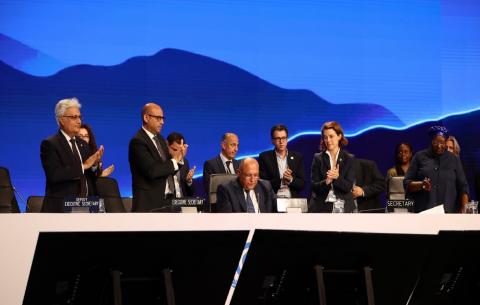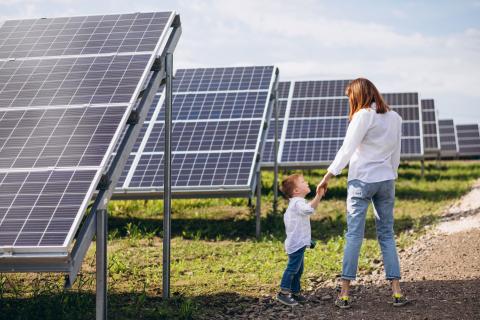When and where does COP28 take place?
The Climate Summit or COP28 will take place in the emirate city of Dubai, in the United Arab Emirates, from 30 November to 12 December 2023. Its choice has been surrounded by controversy as it is being held in a country that is one of the world's leading oil and gas producers and chaired by Sultan Ahmed Al Jaber, the Emirati Minister of Industry and Advanced Technology and CEO of the Abu Dhabi National Oil Company (ADNOC).
"Personally, I am quite sceptical," Ivana Cvijanovic, research assistant professor in ISGlobal's Climate and Health programme and online observer of the summit, tells SMC Spain. "There are concerns about the relationship between the hosts and organisers and the fossil fuel industry, and also about the outrageous number of fossil fuel industry representatives attending, which is a bit difficult to justify," she adds.
Concerns about the relationship between hosts and organisers and the fossil fuel industry
Ivana Cvijanovic
In the opinion of Fernando Valladares, a CSIC researcher and expert on the impacts of climate change on ecosystems, expectations are always high before a COP "and this one is no exception", especially considering that this could be the last chance to avoid exceeding dangerous levels of warming for humanity. However, the scientist admits to SMC Spain: "Those of us who have seen many COPs know that it is difficult, almost impossible or very unlikely, that most of these expectations will be met.
What do the acronyms COP stand for and since when have they been celebrated?
COP stands for Conference of the Parties to the United Nations Framework Convention on Climate Change. This conference is the decision-making body of the United Nations Framework Convention on Climate Change (UNFCCC). The convention was adopted in New York (USA) in 1992, entered into force in 1994 and has been ratified by 198 parties - 197 states and the European Union.
The number 28 of this COP means that it is the 28th meeting of this conference. The first was held in Berlin in 1995. COPs are held annually - except in 2020, due to the pandemic - where countries meet to take action to achieve the climate goals agreed under the Paris Agreement - which was reached at COP21 in Paris in 2015 - and the UNFCCC.
What are the objectives of this summit?
One of its main goals will be to conduct the first Global Stocktake, an assessment of the progress made towards achieving the climate goals. What does this stocktake consist of? The Paris Agreement includes a review cycle (Global Stocktake) which establishes that, every five years starting in 2023, an assessment of the state of implementation of the agreement must be made, including progress towards its three long-term goals, which are:
- Prevent the global average temperature increase from exceeding 2°C above pre-industrial levels, aiming for global warming not to exceed 1.5°C.
- Increase adaptive capacity to the adverse effects of climate change and promote climate resilience and low greenhouse gas emission development.
- Ensure coherence of all financial flows with a climate-resilient and low-emission development model.
This Global Stocktake should be used by countries when submitting subsequent climate action plans (or Nationally Determined Contributions, known as NDCs), which are to be revised upwards every five years.
In addition, COP28 also aims to design a work programme on climate change mitigation - to try to keep the 1.5°C increase within reach -, set a global goal on adaptation and climate finance, including the financial arrangements for loss and damage approved at COP27 in Sharm El Sheik (Egypt). The aim of this fund is to support those facing climate impacts to which they cannot adapt.
"If we are to achieve the goals of the Paris Agreement, emerging and developing countries need more than $2.4 trillion in annual investment in climate action by 2030," Sultan Al Jaber estimates.
The leader also called for this to be "the most inclusive COP". More than 200 civil society groups have written to the UAE and participating governments with demands about human rights in the Gulf nation, reports Reuters. The UAE does not allow political parties and shows little tolerance for dissent. State and local media are tightly controlled and freedom of expression is restricted.
What are the unfinished business of COP27 in Egypt?
Regarding what was left stranded at the previous summit, Carlos de Miguel Perales, lawyer and professor of Civil and Environmental Law at the Faculty of Law at ICADE (Comillas Pontifical University), highlights to SMC Spain the failure to increase the ambition of mitigation and adaptation, or to make progress on climate finance. Also, "the lack of agreement on phasing out fossil fuels".
In Cvijanovic's view, the negotiations are lagging far behind the current state of science and the severity of the problem. "Last year, the main milestone reached was a kind of agreement on the loss and damage fund, which is supposed to be developed and established later. However, it is too little and too late," he warns, citing recent studies showing that many regions of the world are going to be too hot to live in. "I cannot understand how much funding can compensate for the loss of habitability," he says. "What should really be discussed here is relocation," he adds.
Another big elephant in the room is the global food system.
Fernando Valladares
Valladares focuses on the energy system and believes that the negotiations should be used to reach compromises that allow for the transition to other forms of cleaner energy, putting on the table the subsidies that governments continue to approve for fossil fuels.
"Another big elephant in the room is the global food system," says the researcher. According to World Bank data, this sector is responsible for about a third of greenhouse gas emissions.
What is the European Union's position on this summit?
On 17 October the European Council adopted conclusions in the run-up to COP28 on climate finance, underlining its "strong commitment". "The EU and its member states are the world's largest contributor to international public climate finance and have more than doubled their contribution to climate finance in support of developing countries since 2013," they explained in a statement.
The Council also stresses that the EU and its member states are committed to the target of developed countries to collectively mobilise $100 billion a year in climate finance by 2025. They expect this target to be met for the first time in 2023.
In a joint statement by EU Climate Commissioner and chief summit negotiator Wopke Hoekstra and COP28 President Sultan Al Jaber after meeting in Brussels on 13 November, the two stressed that COP28 must achieve the "highest possible ambition".
Hoekstra and Al Jaber referred to the "very positive outcome" of talks in Abu Dhabi earlier this month on the loss and damage fund adopted at the last summit. The commissioner said he was "ready to announce a substantial financial contribution from the EU and its member states" to the fund during the Dubai summit.
What will be the main stumbling blocks?
"The most notable is the possible lack of effective leadership on the part of the COP presidency," says De Miguel Perales. In Valladares' opinion, the main stumbling blocks will be the pressure groups, such as oil companies or the so-called big polluters. "In a place like Dubai, in the heart of the oil-producing countries, they feel very supported and strengthened," he says.
The most notable stumbling block is the possible lack of effective leadership from the COP Presidency
Carlos de Miguel Perales
As was the case at the previous summit, the international geopolitical situation, with fears of a lack of supplies, is also an obstacle to the negotiations, according to the CSIC researcher, not to mention the tensions between countries such as India and China, the rivalry between the United States and China and the situation in Russia.
"There are geopolitical situations that make everything rather more arid and difficult, and, of course, the general stumbling block is economic. The whole world is heading towards a difficult economic crossroads," he warns.
Is it still possible to meet the goal of limiting the temperature increase to below 1.5°C?
As we have seen, the data and forecasts do not point in that direction. One of the most recent is the latest United Nations Environment Programme (UNEP) Emissions Gap Report, which warns that current commitments under the Paris Agreement put the world on track for a temperature increase of between 2.5 and 2.9°C above pre-industrial levels this century.
To stay on the 2°C trajectory would require greenhouse gas emissions to fall by 28% by 2030, just seven years from now, a cut of up to 42% to stay on the 1.5°C path.
"We know that it is still possible to make the 1.5°C limit a reality. This requires tearing out the poisonous root of the climate crisis: fossil fuels. And it requires a just and equitable transition to renewable energy," said UN Secretary-General António Guterres.




